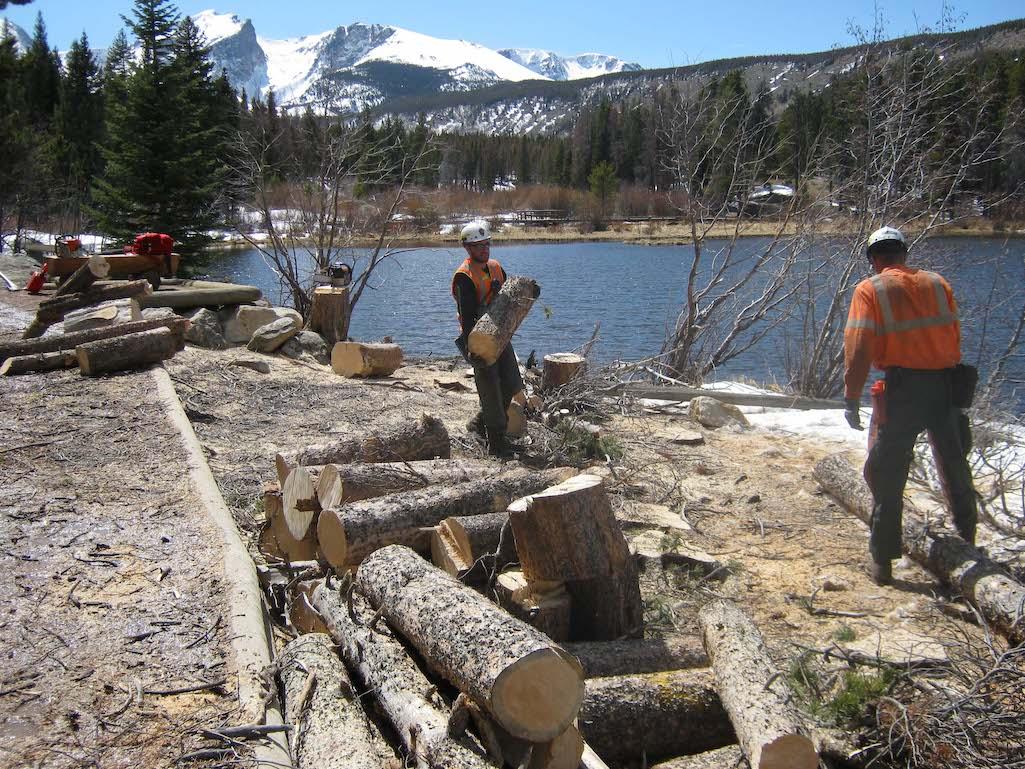
Hazard tree mitigation along Sprague Lake Trail/NPS
Fee increases likely are coming for some visitors to Rocky Mountain National Park, where staff is proposing a $5 hike in daily entrance fees as well as for camping.
Under the proposals, the cost for a daily entry into the park would bump up from $25 to $30. There are no proposed changes to the park weekly pass ($35 per week), park annual pass ($70 per year), or any of the interagency American the Beautiful passes.
The park is also proposing increases to front-country campground overnight fees:
- Summer campground fees would increase from $30 to $35 per night at Moraine Park, Glacier Basin, Aspenglen, and Timber Creek campgrounds.
- Winter campground fees would increase at Moraine Park Campground (the only campground that is open in the winter season) from $20 to $35 per night.
- Group campsite fees in Glacier Basin Campground would increase by $10 per night. This would increase the group sites from $40, $50, and $60 per night (depending on the size of the site) to $50, $60, and $70 per night.
These proposed campground fee increases are based on comparable fees for similar services in nearby campgrounds.
The proposed fee increases are necessary for Rocky Mountain National Park to improve and maintain high-quality visitor services, a park release said. While basic park operations are funded by direct appropriations from Congress, the recreation use fees collected by the park are used to support new projects and the ongoing maintenance of park facilities that directly enhance the visitor experience.
The Federal Lands Recreation Enhancement Act is the legislation that allows the park to collect entrance and amenity fees. This law allows parks like Rocky Mountain National Park to retain 80 percent of the fees collected in park for use on projects that directly enhance the experience of park visitors. The remaining 20 percent of all collected fees is distributed for use throughout the National Park System.
Some of the projects funded through the collection of entrance station and campground fees at Rocky Mountain National Park include:
- Hazard Tree Mitigation: The park is among many areas along the Rocky Mountains where trees have been dying from a beetle epidemic. Recreation fee monies have funded extensive mitigation of hazard trees in or near developed areas and other popular park facilities, such as campgrounds, parking lots, road corridors, housing areas and visitor centers.
- Hiking Trail Repairs and Improvements: Many hiking trail repair projects have been funded by recreation fee monies, such as repairing washed out sections of trail, the installation of bridges, and the installation of vault toilets at heavily used trailheads.
- Wilderness Campsites Improvements: Rocky Mountain National Parks wilderness campsites are used by thousands of backcountry campers each year. Recreation fee monies help fund the maintenance of these cherished campsites.
- Bear Management: Park entrance and campground fees help keep bears wild at Rocky Mountain National Park. Thanks in part to fee dollars collected over the past 20 years, 100% of the park’s garbage cans, recycling bins, and dumpsters are now bear-resistant. The park has also gone from 0 food storage lockers to 352. Your recreation fees also help support visitor education programs focused on black bears.
- Restoration of Historic Rock Walls along Trail Ridge Road: The historic rock walls along Trail Ridge Road provide for visitor safety and a visually pleasant drive. Originally built by the Civilian Conservation Corps, recreation fee program funding allows for damaged sections of these rock walls to be restored by Rocky Mountain National Park staff who specialize in rock work.
Rocky Mountain National Park is accepting public comments on the proposed fee increases. You can find more details and leave your comments at this site.
Comments may also be submitted via mail to:
Rocky Mountain National Park
Office of the Superintendent
1000 US Hwy 36
Estes Park, CO 80517
All public comments on the proposed fee increases will be accepted through January 7, 2022.



Comments
I 100% support increasing the entry fees, and would go as far as questioning why they aren't increasing the weekly rate the same $5? It almost makes no sense to increase the daily rate to within $5 of the weekly rate. And $35/week is a STEAL. $5 entry for a carload per day? We easily spend that at other attractions per person.
The campground fees on the other hand, now it's starting to get steep for what you get-a basic place to park (albeit with one heck of a view). The bathrooms and dump stations are extremely dated and in need of replacement or refurbishing in many places with no electrical sites. No, I'm not pushing for electrical sites, but at many state parks throughout the country that price includes electricity. Just because the private parks outside the park gouge people, that doesn't mean that the NPS should.